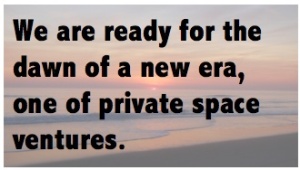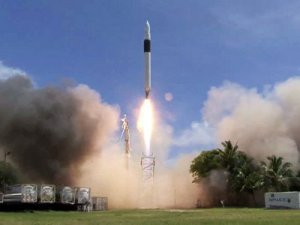I've been feeling a bit inspired about our prospects in space, lately. Foremost (of course) by the incredible competence displayed by the makers of the Curiosity probe that landed on Mars, last week, and the JPL controllers and the citizenry that backed such a wonderful venture.
If we must preen about "american exceptionalism" then let it be about Curiosity - and other admirable traits - that truly are exceptional. Also recently, I met one of the great astronauts of our time, Story Musgrave, at the World Science Fiction Convention in Chicago, where another topic was the greatness displayed during pioneering days in space - in light of the passing of Neil Armstrong.
For a recent interview I was asked -- Where is manned spaceflight headed in the near term?
 First off, these responses are not given in my role as a member of the board of external experts for NASA's NIAC program that grants seed funding for new and innovative advanced concepts. The comments that follow are off-the-cuff speculations about the longer range, in an area NIAC scarcely covers.
First off, these responses are not given in my role as a member of the board of external experts for NASA's NIAC program that grants seed funding for new and innovative advanced concepts. The comments that follow are off-the-cuff speculations about the longer range, in an area NIAC scarcely covers.
Having said that, let me add that I see two drivers and two paths ahead for human spaceflight, one slow and plodding, the other quick and exciting. Both will be needed. Each will benefit from the other.
Ever since Challenger blew up, NASA's meticulous approach to manned spaceflight has been to redouble caution. To fill in each missing step, then the sub-phases between each step. After Columbia, this fill-in-every-gap method has led to such flawless undertakings as the recent Curiosity lander's spectacular (and spectacularly complicated) landing on Mars...
... but that was a robot. When human lives are at stake, the process becomes so carefully mature that - in effect - nothing gets flown at all. At minimum, human-rating every component multiplies costs by as much as two orders of magnitude, in some cases. Let's be plain. If today's NASA constituted our only path to human spaceflight, countless thorny problems and sub-problems would be vanquished! But nothing would ever actually fly with people aboard.
Fortunately, through this process NASA keeps developing new technologies. So do the civilian world, foreign governments and the military. These improvements trickle - or gush - and spread. New thresholds have been reached in computers and sensors, in equipment capability and reliability. And in plummeting hardware prices.
 One result? We are ready for the dawn of a new era, one of private space ventures. And, fortunately, the politicians - those in power at-present - seem perfectly ready to welcome non-state activity. Instead of raising obstacles, they seem bent on clearing a path.
One result? We are ready for the dawn of a new era, one of private space ventures. And, fortunately, the politicians - those in power at-present - seem perfectly ready to welcome non-state activity. Instead of raising obstacles, they seem bent on clearing a path.
From the Rutan/Branson Spaceship to Elon Musk's SpaceX, there are dozens of private manned and unmanned missions being planned. Some of them leverage upon the desire of the rising caste of super-rich for unusual experiences, starting with sub-orbital jaunts. Plans are in motion to extend this market, leading downstream to space hotels and - eventually - private moon landings. Even more boldly entrepreneurial, the new Planetary Resources company plans to access the vast wealth of asteroids.
All of these things can be done now because technological thresholds are falling... and also because they can allow higher risk ratios, because private ventures aren't answerable to the same levels of enforced care as public ones. The cost effects of allowing lethal failure rates in the one-millionth probability - instead of one-billionth - is nothing short of astronomical.
== A New Barnstorming Age? ==
 We may, at last be ready to embark on the equivalent of the the great age of barnstorming aircraft development, that our grandparents saw in the 1920s, when risk - and even some loss - was considered part and parcel of courage and exploration. When the new frontier was legitimate territory for tinkerers (albeit, today they would be billionaire tinkerers).
We may, at last be ready to embark on the equivalent of the the great age of barnstorming aircraft development, that our grandparents saw in the 1920s, when risk - and even some loss - was considered part and parcel of courage and exploration. When the new frontier was legitimate territory for tinkerers (albeit, today they would be billionaire tinkerers).
If so, it will have come about from a mix of government investment in meticulous process and checklisting a myriad details... meshing well with the unleashing of private ambition.
No example so perfectly disproves the idiotic canard that everything must be all-government... or else that all government action is evil and wholly uncreative. We are a complex people in a complex age. But we can rise above comforting nostrums to realize, a careful mix was how we got everything we see around us. A mix that is negotiated by goal-driven grownups -- that is how we'll get farther ahead.
== What are pros/cons of each approach? ==
 The Branson/Rutan "Spaceship One" approach, and others like it, have the advantage of paying for themselves incrementally, improving their methods and capabilities in the same way. Those offering suborbital jaunts won't have to answer to taxpayers or budget committees. If Branson and Rutan and the others deliver a safe and peerless experience, the new lords will thrust money at them, hand-over-fist (doing us all a favor by recycling some of it into useful and cool things.)
The Branson/Rutan "Spaceship One" approach, and others like it, have the advantage of paying for themselves incrementally, improving their methods and capabilities in the same way. Those offering suborbital jaunts won't have to answer to taxpayers or budget committees. If Branson and Rutan and the others deliver a safe and peerless experience, the new lords will thrust money at them, hand-over-fist (doing us all a favor by recycling some of it into useful and cool things.)
Some of us will also go, through prizes and lotteries (and gifts to favorite authors?) Calling Fantasy Island!
And their next products will emerge in a matter of due course. Orbital hotels and - quicker than you now might expect - private moon landings. These missions will be of very little scientific value. (The moon's only likely use for a generation will be as a tourist attraction. There are no other near-term features of any value.) But they will leverage technologies developed by NASA and others, transforming them into off-the-shelf tools and something that today's NASA is ill-equipped to do -- actual, risk-taking human crewed expeditions.
In time, this will transform into own-your-own sub-orbital rocket kits, as I depict - with pulse-pounding action! - in an early chapter of Existence. (See this portrayed in some early images in the vivid preview-trailer. )
SpaceX and others are counting on winning contracts to deliver commercial and government payloads into orbit, predictably and reliably. This will soon include human crews for the Space Station. The Dragon capsule will not be optimized for paying private customers seeking a "yeehaw" experience. But I expect there will be some such, as well.
Way back in 1982 I headed a team at the California Space Institute that outlined an alternative space station design, using Space Shuttle External Tanks, that would have been soooooo sweet. Just five launches would have led to a station larger than the present one and far more capable. Ah,well. The tanks are gone. (But sample it with my short story: "Tank Farm Dynamo "!)
"!)
Still, some of the new inflatable structures... and composites being developed at UCSD's new Structural and Materials Engineering Building... may lead to new, commercial stations that offer hotel experiences in the sky. And even though the moon is sterile scientifically and for physical wealth, it may (as said earlier) be enough of a tourist allure to propel us back to that sere (but romantic) destination.
== What about the Old Dream? Missions to Mars? ==
Oh, we will poke away at the big stuff. Certainly the shift away from a return-to-the-moon boondoggle, which almost no scientist on Earth supported, was a step in the right direction. And with private capitalists salivating over asteroids, it does look as if the choice was was a correct one.
NASA will keep developing the technologies we'll need for missions to asteroids, to Phobos (potentially one of the most valuable rocks in the Solar system), and eventually Mars. We could afford to spend twice what we do and pick up the pace. The payoffs - just for remembering we're a scientific civilization - would be overwhelming.
Oh, and of course other nations will be joining this mix, in ever-greater force. In Existence, I portray manned spaceflight getting a nationalist impetus when the Chinese start flexing their competence and muscle out there. It could help propel interesting times.
Still I was asked about just human spaceflight in the near term. And the near term to me looks commercial, private, bold, close-to-home, rather lavishly exclusive...
...but fun.




Comments